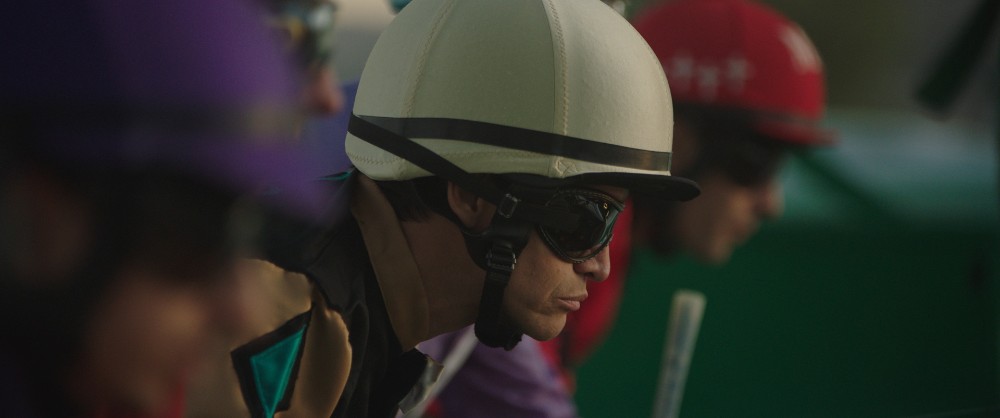
As 2021 comes to an end, audiences will finally have a chance to see a movie that received quite a few accolades out of this year’s Sundance Film Festival back in January.
Clint Bentley’s Jockey stars the always-busy “character actor” Clifton Collins Jr., who you may know from any one of the dozens of TV series he’s appeared on, including Westworld and the Veronica Mars reboot from a few years back. Or you might know him from a wide range of very different films that include Honey Boy, Super Troopers 2, The Mule, Star Trek, Transcendence, or Guillermo del Toro’s Nightmare Alley, which is still in theaters.
In Jockey, Collins plays Jackson Silva, a soon-to-retire horse jockey whose plan is changed when he meets the young Gabriel (Moises Arias), who claims to be Jackson’s illegitimate son. Jackson decides to take the young man on as a protegée while still trying to win one more tournament for his trainer Ruth (Molly Parker).
Collins’ performance has already earned him a Film Independent Spirit nomination, but Bentley’s indie film is a great display of how crafts can be used to raise the production value of even a smaller-budgeted film, as shown by the cinematography by Adolpho Veloso, the production design of Gui Marini, and the gorgeous score by Aaron and Bryce Dessner.
Below the Line spoke to Bentley over Zoom a few weeks back for the following interview.
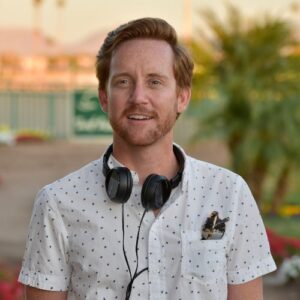
Below the Line: Jockey is such a beautiful, beautiful movie, I mean, just all around. I know you did a short, also set in this world. I’m not sure if it was actually related or just another thing about a jockey, but did that just lead to you wanting to do more in this world?
Clint Bentley: No, I’ve been developing the feature with my co-writer Greg Kwedar for about three years. We did a short shoot on a live working racetrack to kind of see… the idea was always to take a small crew and blend them into a live working racetrack for the feature, so we needed to do an exercise to see if we could do that safely and bring actors in, and so, it was just kind of to test a style. Other than that, the story is not connected or anything like that of that short film. Once we found out we could do it safely, we just really leaned into that for the feature and shot with a little 10-person crew on the backside of a live \-working racetrack in Phoenix.
BTL: Did you make this whole movie during COVID or did you shoot beforehand?
Bentley: No, we shot it right beforehand, luckily. Literally, we wrapped right before lockdown happened, and so, it was really fortuitous that way, and then being in lockdown for all 2020 and having nothing else to do, my editor Parker Laramie and I, we got a cut of the movie, and it was good, but it wasn’t as good as it is now. We really just spent the time to let it find its way to breathe and really gave its rhythm. It was really a blessing in disguise to be able to just spend that extra time cutting on it.
BTL: I’ve spoken to so many first-time feature makers who are literally working until the last minute to get their movie ready for Sundance, but you probably were able to get it done earlier than normal for a Sundance film.
Bentley: Oh, I wish, man, I wish. We got it done kind of in time for Sundance, but then our composers, Aaron and Bryce Dessner, they had to take a little break, to not only work on Mike Mills‘ movie, they were working on the score for that, but then they were also working on Taylor Swift’s pandemic albums. And then, we got our score right at the end, and then it was a mad dash to finish it in time for Sundance. But Sundance was very gracious to give us a bit of time.
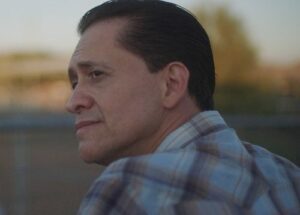
BTL: I actually spoke to them last week, mainly for Cyrano, but we did talk about your movie a little and Mike Mills’ C’mon C’mon. It was amazing the work they did in the last year.
Bentley: They’re incredible. They’re such brilliant artists, and such good people, too, as you probably found out.
BTL: When you were going to work in this world, how much time did you spend with jockeys doing research? Did you have any connection to that world that pulled you in that direction?
Bentley: Yeah, I’m the son of a jockey., and so I grew up in that world. I know all those people. Not all the people in the film but that milieu of people. I know them from my childhood, so yeah, I got a big head start that way, but then also, [I] did a ton of research to learn the world of horse racing as an adult versus what I knew as a kid. And doing that research alongside, not only my co-writer Greg but also Clifton, and seeing what they were finding with fresh eyes was really eye-opening to me and gave me a new understanding of the world.
BTL: Even before watching the movie, I loved the fact that it had Clifton in a leading role, since I’ve been such a fan of him as a character/supporting actor for years, and just haven’t seen anyone give him such an amazing role to shine in like this. What made you think of him for this role?
Bentley: He’s amazing. You’re exactly right, and he’s done so much for so long. He does one thing very well in a movie and then he’ll go on to another one, and do one thing very well. Anytime you see him in a scene, you feel like even though he’s just in one or two scenes, he’s giving you a whole world of a character. Greg and I worked with him on our first film, Transpecos. He was in a supporting role on that, and we saw that immense talent that we were just talking about. And then on top of that, I became friends with him after that movie and just realized how much playfulness he had and thoughtfulness, and he can tap dance, and he’s funny. He’s also got a melancholy to him as well and just wanted to give him a role that could showcase everything that he could do. There was never any doubt that he would do a beautiful job. It’s just so nice now to see people appreciating that.
BTL: In the new Guillermo del Toro movie (Nightmare Alley), he’s just a guy playing a guitar, but you do want to know more about him.
Bentley: The funny thing about that is Mr. del Toro wrote that role for him, because of that same thing we’re talking about, Cliff’s talent, that you want him in something with you, even if he’s just a guy playing a guitar.
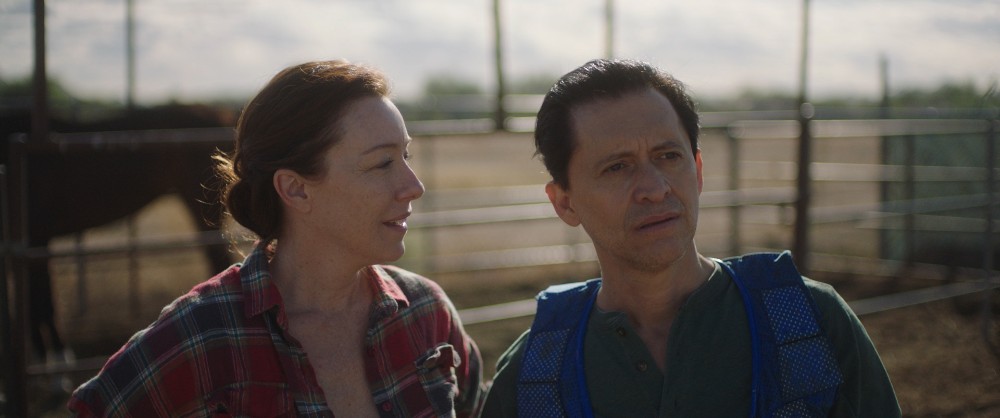
BTL: I’ve also been a big Molly Parker fan for a very long time, but I feel she’s a ringer, because she can do everything and anything really.
Bentley: She’s brilliant [and] brings so much to roles that she does. A lot is being made of the research that Clifton did, and how he threw himself into the role, and he spent a lot of time with jockeys and lost a lot of weight, which he did, and it’s amazing. Also, we set her up with a trainer on the backside of a track, a female trainer, and Molly spent so much time with her working in the barn. She’d wake up every morning at four to go out there and work the barns before coming to set. [She] just got to the point where she could run the barn, as well as anybody else out there. She did an immense amount of research.
BTL: Were you able to find a single racetrack where you could pretty much shoot everything you needed? How did you find that location?
Bentley: It was written to be shot on one racetrack, and it was conceived of that form early on. Greg and I looked all across the country at different racetracks, and as soon as I stopped and visited Turf Paradise, not only did it just have such an interesting spirit to it, it hasn’t been renovated since the 70s. It saw its heyday back in the ’50s and ’60s. It just had such a unique character of its own that a lot of other racetracks don’t have, because they’ve been bought by casinos and renovated. And so it was really a no-brainer to use that one.
BTL: I want to ask about your Brazilian DP, who I’m not sure has ever shot any American or English language films. (I think one of my colleagues will be talking to him or already has.) But the movie just looks great, so how did you find him and work with him?
Bentley: He’s incredible. His name is Adolpho Veloso. He’s from Brazil. He hadn’t done many features. If this was his first American feature, I feel very lucky and honored for that to be the case. But really, I had been a fan of his work for a long time. He had done a documentary series called “On Yoga, the Architecture of Peace,” and just watching what he did, reading behind the scenes that he had just gone out to the Himalayas or the mountains of Nepal just with a single camera. The shots that he would get that were just lit by a little campfire that looked like Caravaggio paintings, I was like ‘This guy would be amazing.” [I] then had one conversation with him over Skype, had never met him in person, and then we were like, “Yeah, let’s do it. Let’s take a chance.” He really did an extraordinary job of, not only making it look beautiful with… we only had a 10-person crew and no lights and a very small lighting package. He also just found a cinematic voice to it that I was really hoping for, a visual language that I was hoping for but didn’t quite know how to get to, and he did a magnificent job.
BTL: I hope you signed a multi-picture deal with him so he’ll shoot your other movies.
Bentley: I need to.
BTL: I know it’s hard to do that in independent, but I have a feeling that once people see Jockey, he’s going to be very much in demand.
Bentley: I know. I hope he’ll take my calls.
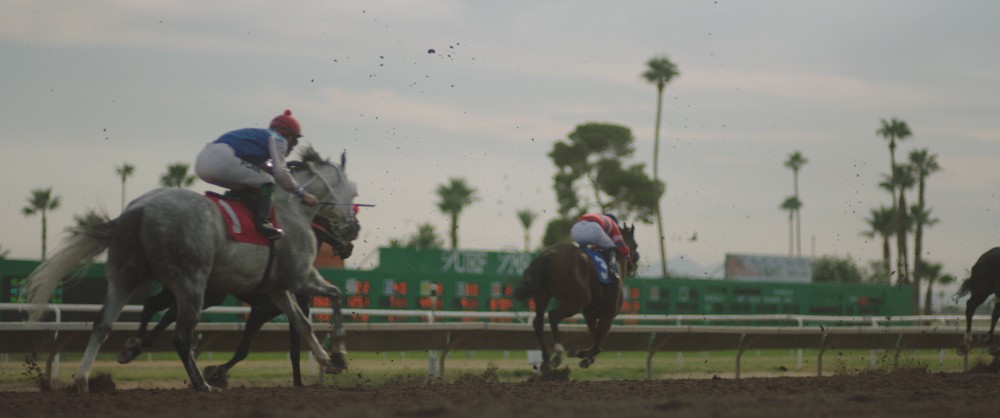
BTL: By the way, did you do any stage work at all for this movie, such as the interiors of Jackson’s trailer? Or was that all on location, as well?
Bentley: Everything was on location. The trailer that he lives in was an old beat-up Airstream trailer that a company owned. They were getting ready to renovate it and put all new guts in it. It was perfect, because it was a blank slate, and we could do whatever we wanted to it. Our production designer Gui Marini, who’s also Brazilian — he’s Adolpho’s friend from film school. He came on and just did such a beautiful job at building things out, taking the world that existed out there, and just tweaking it enough to where it looks like itself, but a more cinematic version of itself. I could talk for hours about Gui’s work, he’s great.
BTL: Going back to the research, was that support group for jockeys, were those real jockeys telling their real stories? That was an amazing scene.
Bentley: Yeah, thank you. Those are real jockeys, telling their own stories. Literally, there was a lot of information that I wanted to get across about the world, but you couldn’t do it in dialogue, because it would sound so cheesy. So really just like breaking form and sitting down in this documentary space and letting those guys just tell whatever they were feeling. I would just throw out prompts of like, “Hey, talk about the first time you won a race or talk about the first time you got really hurt,” and they would just go from there. They’re so eloquent, and they wrote it better than Greg or I could.
BTL: Because it’s true. I do want to talk more about working with Aaron and Bryce, because I’m a bit of a music head and a National fan as well. What kind of direction did you give them for this? They have three scores coming out this year, but they’re all very different. What did you want their music to bring to your movie?
Bentley: We talked a lot early on about the overall tone of the movie, and they saw the movie — they watched it without score, I believe — and kind of got a feeling for it. We were very budget-strapped on every aspect of the movie, but also the score. The thing we talked about with them was just… Adolfo and I approached the shooting of the movie of like, instead of doing five mediocre shots, let’s do one good shot. And let’s approach every scene like that. That was the way we leaned into this, and luckily, those guys, they’re multi-instrumentalists, and so they can do so much by themselves. But then also, they had a lot of string samples from previous projects that they cooked up, and all these sound samples that they did such a beautiful job at making these soundscapes and then moving those into very melodic pieces, at times, but just it being this melody that brings us through the movie. The only notes I had to give them were just like… in case it wasn’t apparent from the scenes, or just giving them thoughts on what I wanted the scene to feel like or not feel like. And then outside of that, it was very minimal.
BTL: I especially liked the end credits song, which seemed so different and unexpected from them.
Bentley: That’s actually from a band out Montreal. That one song is from a band called Hologramme from outside of Montreal, and it’s a song called “Felicity,” and it’s a funny story. The day before I left to drive 15 hours out to Phoenix from my house in Texas, I was with my wife, just hanging out with her and doing a little shopping, and we heard this song in a thrift store. And I was like, “Oh my god, what is this?” I just grabbed it on my phone, and then listened to it probably like 100 times on the way out to Phoenix, and then, it became kind of this anthem for the crew. I built a playlist for the crew, and that was on there and everybody kept being like, “What is the song?” and everyone connected with it. It was amazing. I’m glad we got to use it.
BTL: When did Sony Classics get involved? I think that Tom Bernard and Michael Barker seem to love horseracing movies, and next time I see them, I have to ask them about that.
Bentley: Ask them about it. They got involved literally a couple days before we premiered at Sundance. They saw the movie early and believed in it, and I’m just so thankful that they hopped on board and saw the value of it.
Jockey opens in New York and L.A. on Wednesday, Dec. 29, and presumably, will expand to other cities in early 2022. Look for Below the Line’s interview with the film’s cinematographer very soon, and just for your own enjoyment, here’s Hollogramme’s “Felicity” which plays over the film’s end credits:
All film photos courtesy and copyright Sony Pictures Classics. All images by Adolpho Veloso.





